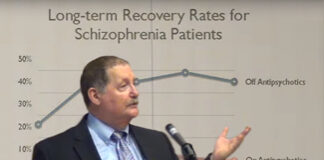Tag: Antipsychotics
BPS Releases Review of Alternatives to Antipsychotics
BPS releases report encouraging behavioral interventions for people with dementia, rather than antipsychotics
Acute Respiratory Failure More Likely in COPD Patients Prescribed Antipsychotics
Researchers recommend that healthcare professionals be vigilant regarding the signs of respiratory failure among patients with COPD who are receiving antipsychotics, especially during the initial treatment phase.
Is Schizophrenia Associated with Brain Volume Changes Independently of Medication?
Duncan Double, on his Critical Psychiatry blog, published a series of posts exploring the effects of antipsychotics on brain volume and the contention that...
Mental Health Nurses Do Not Routinely Assess for Effects of Antipsychotic...
Researchers believe that side-effect monitoring is critical because of the increase in the use of antipsychotics
1 in 6 Adults in the US Takes a Psychiatric Drug
Overall, 16.7% of 242 million US adults reported filling 1 or more prescriptions for psychiatric drugs in 2013.
Review Questions Long Term Use of Antipsychotics
Patients who recover from a single episode of psychosis are often prescribed antipsychotics long-term, despite a lack of evidence for this practice
Curing Schizophrenia via Intensive Psychotherapy
I believe that an Intensive Psychotherapy can lead to healing and, often, a cure of psychotic states. By cure I mean the cessation of delusions and hallucinations, and a gradual titration off of antipsychotic medication, with the cure lasting—even without continuing psychotherapy.
When Psychiatric Medications Cause Psychiatric Symptoms
Dr. Yolande Lucire, a psychiatrist from Australia, recently published a paper about the iatrogenic effects of psychiatric drugs.
The Case for Neuroleptics Reducing Recovery from 80% to 5%
On October 7th I gave a talk titled "The Transformation Triangle:
Public Education, Alternatives & Strategic Litigation." In thinking about my talk, I realized that I could piece together a very short video on neuroleptics reducing the recovery rate from 80% to 5%.
Policies to Reduce Antipsychotic use Among Elderly are Failing
Research reveals that rates of antipsychotic prescribing to the elderly in the UK have not dropped despite national recommendations.
Confessions of a Trespasser
In a recently published commentary in Psychiatric Times, Ronald Pies and Joseph Pierre made this assertion: Only clinicians, with an expertise in assessing the research literature, should be weighing in on the topic of the efficacy of psychiatric drugs. They wrote their commentary shortly after I had published on madinamerica “The Case Against Antipsychotics,” and it was clear they had me in their crosshairs.
The Case Against Antipsychotics
This review of the scientific literature, stretching across six decades, makes the case that antipsychotics, over the long-term, do more harm than good. The drugs lower recovery rates and worsen functional outcomes over longer periods of time.
Researchers Discover How Antipsychotics Lead To Parkinsonism
A new study published this month in the journal Neuron identifies the mechanism by which antipsychotic drugs can induce parkinsonism, a condition involving movement...
“Jury Smacks J&J with $70M in Damages in Latest Risperdal Breast...
Fierce Pharma reports: "Johnson & Johnson ($JNJ) is fighting more than 1,500 legal claims that its antipsychotic Risperdal triggered breast development in boys, and...
Royal College of Psychiatrists Still not Interested in Discussing Important Evidence...
The annual meeting of the UK’s Royal College of Psychiatrists is in full swing at the moment in London. The conference will again not be debating important new findings about antipsychotic drug treatment. Two years ago the conference organising committee rejected a suggestion to discuss this issue. This year I proposed a similar symposium. The proposal was rejected again. I am extremely concerned that the Royal College conference organising committee do not appear to be aware of the importance of this issue.
Who Will Guard the Guardians of Psychiatry?
The assertion that the so-called antidepressants are being over-prescribed implies that there is a correct and appropriate level of prescribing and that depression is a chronic illness (just like diabetes). It has been an integral part of psychiatry's message that although depression might have been triggered by an external event, it is essentially an illness residing within the person's neurochemistry. The issue is not whether people should or shouldn't take pills. The issue is psychiatry pushing these dangerous serotonin-disruptive chemicals on people, under the pretense that they have an illness.
The Psychiatry Sandcastle Continues to Crumble
Psychiatry would long since have gone the way of phrenology and mesmerism but for the financial support it receives from the pharmaceutical industry. But the truth has a way of trickling out. Here are five recent stories that buck the psychiatry-friendly stance that has characterized the mainstream media for at least the past 50 years.
“B.C. Care Homes Provide Antidepressants Without Diagnoses”
New data reveals that the majority of care homes in British Columbia, Canada are giving out prescriptions for antidepressants and antipsychotics without a diagnosis....
In Search of an Evidence-based Role for Psychiatry
A dilemma for all of us who are struggling to broaden our understanding of human distress beyond simplistic, pessimistic, bio-genetic ideology, and to improve our mental health services accordingly, is whether or not to soften our criticisms of psychiatry in the hope of reaching those psychiatrists whose minds are not totally closed. But doing so rests on the assumption that change can come from within the profession. For the last few decades examples of that are few and far between.
Testifying in Vermont: Forced Drugs
Vermont Governor Shumlin recently suggested a change to state law that would accelerate the process under which a person could be forced to take antipsychotic drugs against her will. The House Human Services Committee reviewed this proposal and I was asked to testify. What follows are my comments.
Family Oriented, Home-Based Treatment Best for Youth with Symptoms of Psychosis
A pathbreaking new study out of Finland suggests that early intervention programs for youth experiencing psychotic-like symptoms may see the greatest improvement when treatment works within the home rather than in a hospital setting. The research, to be published in next month’s issue of Psychiatry Research, found greater improvement in functioning, depression, and hopelessness among teens in a new need-adapted Family and Community oriented Integrative Treatment Model (FCTM) program.
Timberrr! Psychiatry’s Evidence Base For Antipsychotics Comes Crashing to the Ground
When I wrote Anatomy of an Epidemic, one of my foremost hopes was that it would prompt mainstream researchers to revisit the scientific literature. Was there evidence that any class of psychiatric medications—antipsychotics, antidepressants, stimulants, benzodiazepines, and so forth—provided a long-term benefit? Now epidemiologists at Columbia University and City College of New York have reported that they have done such an investigation about antipsychotics, and their bottom-line finding can be summed up in this way: Psychiatry’s “evidence base” for long-term use of these drugs does not exist.
J&J Loses $1.75 Million in Risperdal Male Breast Trial; Thousands of...
In the third major verdict of its kind, drug giant Johnson & Johnson was ordered to pay a Maryland man who grew female breasts while taking the antipsychotic Risperdal. The company failed to warn doctors, patients, and regulators of the risk of abnormal breast development in young males and now faces about 5,400 lawsuits involving the drug.
“Drugs, Greed and a Dead Boy”
New York Times columnist, Nicholas Kristof, relates the story of Andrew Francesco, a boy who began taking Ritalin at age five and died from complications with Seroquel when he was fifteen. His father, a former pharmaceutical industry executive, reveals the industry’s greed in his memoir “Overmedicated and Undertreated.” Now the industry is pushing for a first-amendment right to market its drugs for off-label uses.
The Recovery After an Initial Schizophrenia Episode (RAISE) Study: Notes from...
I was a psychiatrist who participated in the Recovery After an Initial Schizophrenia Episode Early Treatment Program (RAISE ETP). Although I welcomed the positive headlines that heralded the study's results, the reports left me with mixed feelings. What happened to render the notion that talking to people about their experiences and helping them find jobs or go back to school is something novel?




















